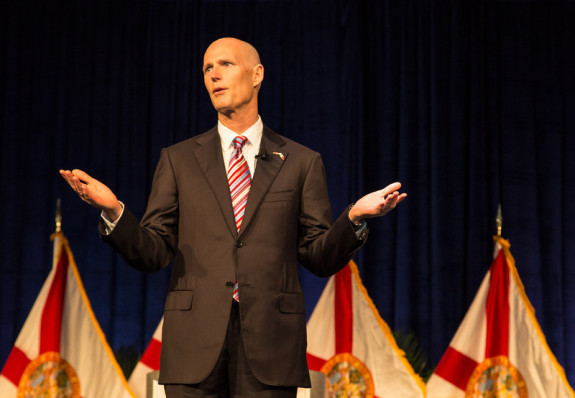
Gov. Rick Scott has been frequently rejecting the Florida Bar’s lists of lawyers to nominate judges. (Photo via Flgov.com)
By Ashley Lopez
Florida Center for Investigative Reporting
Gov. Rick Scott is raising eyebrows for the number of people he has rejected from the Florida Bar’s recommended list of candidates for the judicial nominating commission, according to reporting from The Tampa Bay Times/Miami Herald Tallahassee bureau.
The state’s judicial nominating commission is a group of lawyers that screens people for potential judge positions in the state. Experts have said the number of people that Scott has rejected from the Florida Bar’s list of potential screeners has not been seen before. Steve Bousquet of the Times/Herald reported this week:
Gov. Rick Scott, seeking to bring the court system more in line with his conservative outlook, has repeatedly rejected lists recommended to him by the Florida Bar of lawyers seeking to screen candidates for judgeships.
Scott has rejected dozens of attorneys the Bar has nominated to serve on judicial nominating commissions, created decades ago to professionalize the bench and make merit and qualifications at least as important as political connections.
“He wants people with humility,” says Scott’s chief counsel, Pete Antonacci, “and he wants judges who will follow the law and not make it up as they go along.”
The Bar said Scott’s two predecessors, Charlie Crist and Jeb Bush, never rejected any of its nominees.
All 26 nominating commissions for the trial and appellate courts and the Supreme Court are composed of nine members. Scott appoints five members of his choosing and must appoint four others from lists provided by the Bar’s Board of Governors, some of whom are liberal Democrats who did not support Scott’s election.
The governor has rejected the lists 16 times and has never publicly given a reason and is not required to do so.
According to the Times/Herald, “Lawyers who are registered Democrats, are aligned with left-leaning groups or who promote themselves as trial lawyers appear to have little hope of gaining the governor’s favor.”
This isn’t the first controversy surrounding conservative political influence on the courts—especially in Florida.
Last year, there was a proposed constitutional amendment on Florida’s ballot – put there by the GOP-led state Legislature—that would have required the Florida Senate to approve any Florida Supreme Court justice appointed by the governor.
There was also a campaign led by conservative groups to oust three of the Florida Supreme Courts most liberal justices.
The money behind that particular campaign was one of the subjects in a recent report released by the Brennan Center for Justice at New York University’s law school. The Daily Beast highlighted the study:
The flood of special interest money into elections is threatening the integrity of the judicial system, says “The New Politics of Judicial Elections,” a report released Thursday. The numbers are stark: $56.4 million was spent on high court elections in the 2011-12 cycle, with $33.7 million going into state Supreme Court campaign TV ads, up 42 percent from the ’08 campaign. “It’s the biggest threat to democracy that nobody’s heard of,” says Bert Brandenburg, executive director of Justice at Stake, the nonpartisan group that partnered on the report with the Brennan Center and the National Institute on Money in State Politics.
Courts and judges are supposed to be insulated from politics, but the Supreme Court’s Citizens United decision in 2010 unleashed special interest money to a degree previously unseen in judicial elections. Out-of-state money had already begun to influence judicial campaigns, and Citizens United “poured gasoline on it,” says Brandenburg. Television ads aimed at pressuring judges and skewed toward crime are reminiscent of the infamous Willie Horton ad from the 1988 presidential campaign. “The Willie Horton ad was so stigmatized at the national level because of race baiting, yet they have become a new normal at the judicial level,” says Brandenburg.
… Seven of the top 10 “Super Spenders” the report identifies are conservative business groups, including the Koch Brothers and Americans for Prosperity. The latter spent $155,000 on direct mail and television advertising in Florida in an effort to unseat three justices who had voted to reject a ballot proposal that would have amended the state constitution to resist the Affordable Care Act. Bolstered by fundraising campaigns of their own with money raised principally from lawyers, the three justices retained their seats. Still, the trend is disturbing, says Brandenburg: “In an arms race, whichever side you come out, you vow to spend more. It creates a system where people fear justice is for sale.”
The constitutional amendment aimed at changing the appointee process for Florida Supreme Court justices also failed in Florida.
